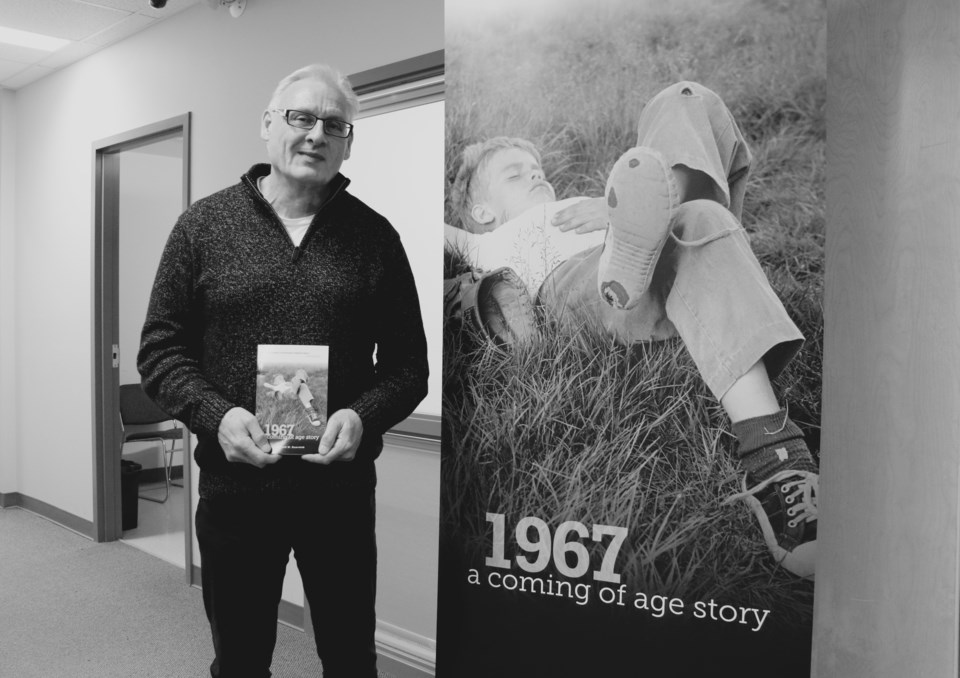Richard Doorink, who released his new book 1967: A Coming of Age Story, held a booksigning Friday afternoon at the Yorkton Public Library, and was on hand to chat with eager readers about the story.
Testament to the book’s quality, which has its roots firmly planted in Yorkton, the book has also been picked up for distribution by major retail chains, including Chapters/Indigo and McNally Robinson.
“The short version of how it came about is I had always written,” Doorink says.
“But I really hadn’t done anything with it. As time went on I really wanted to write. I had done short stories here and there, and I wrote a short story about a birthday party which happened to be set here in Yorkton from that time period. I wrote another story, from that period, and one more, and they were all thematically connected to this particular time in place in Yorkton.
“When I stepped back, I said ‘Well, that’s pretty weird,’ because I hadn’t consciously set out to do that. So I thought maybe I could do a collection of short stories, and out of that I’d get a novel. So the more I wrote, the more I realized maybe I could actually get ‘a book’, instead of just a collection of short stories.
“I worked on it, and by 2014 I had an overly long book, which I knew needed to be edited. I went to the literature festival in Toronto and did a pitch seminar and got widely trounced,” he said with a trace of amusement.
“The book I wrote was not, ‘flavour of the time’, if you will. They were looking for young adult; vampires, and, you know, Harry Potter books. So I got a little depressed, but the seminar I went to was actually arranged through Humber College.
“I called them and said ‘I think I need a little more training,’ and sent in fifty pages. They said well, if you sign up by the end of the week you’re in the program, you’ll get a mentor, and we’ve got one we think is perfect for what it is you’re writing.’
“In 2015 I did the Humber School creative writing program and worked on my book. From that, I ended up with a fully formed narrative --- linear; a day in the life. It turned out to be a day in the life story.”
The title and time period stand out, in particular.
“I chose the title for a couple of reasons. One, was it was Canada’s 100th anniversary. So it kind of stuck out because everything we did that year somehow related to that to the point where in the book I talk about the Bobby Gimbal song we heard over, and over and over. And the special maple leaf design...when I wrote the book I realized it had to be organized thematically and it had to have structure. So what I did was I just picked a 12 month cycle. The book starts in September of 1966, which is when I actually came here [to Yorkton] and a lot of the book is this young boy who tries to fit in. So ‘67 kind of positions it in a time and place that people can pretty easily understand. That’s sort of the significance of it."
For those that weren’t around in that time period, however, the mystique still remains and Doorink was asked about the specialness of the Centennial year.
“I was at my old school today -- Columbia -- which I had not been to back to for fifty years, and I got to speak to my first group -- grade eights, and my second group, grade sevens, and I got to talk about some of the things of the time period. There was no social media. There were no cell phones. There was one TV station, and you’ve got Yorkton, kind of plopped in the middle of the Prairies. A lot of people might look at it as an isolating place to be, but it was a great place to be. It was a safe place to be and you had a great sort of community -- everybody knew what was on TV, most everybody played hockey. It was a very tight knit community.
“It brings you back to a time and place that doesn’t exist anymore, and so, you can look at the book from a bunch of different perspectives; the first being that it is a nostalgic time in place that doesn’t exist. You can see it as a coming of age story; this boy has an event during this time period that really alters the way he thinks about things -- a lot of the things that haven’t been talked about in the family suddenly become clearer. But the third way you can look at the book, which is sort of a deeper aspect to the book, is that when you’re a child, a kid, a young adult -- you don’t really have a big world view. And there’s this big discrepancy toward what is really going on and what adults tell their kids -- compared to what’s really happening. As a kid, you just sort of accept all these things [that you’re told] as the truth. Later on in life you find out, you know, that Uncle Bob wasn’t necessarily an uncle, and somebody was sent away because they were pregnant; or maybe there’s things in your family history that you learn, really, kind of reorder how you think things were. So really a deeper level of the book is about the things that parents don’t really talk to their kids about.
“I think what I’d like people to take away from it is that they’ve read a really good book, first and foremost.”
The book is available for sale here.



